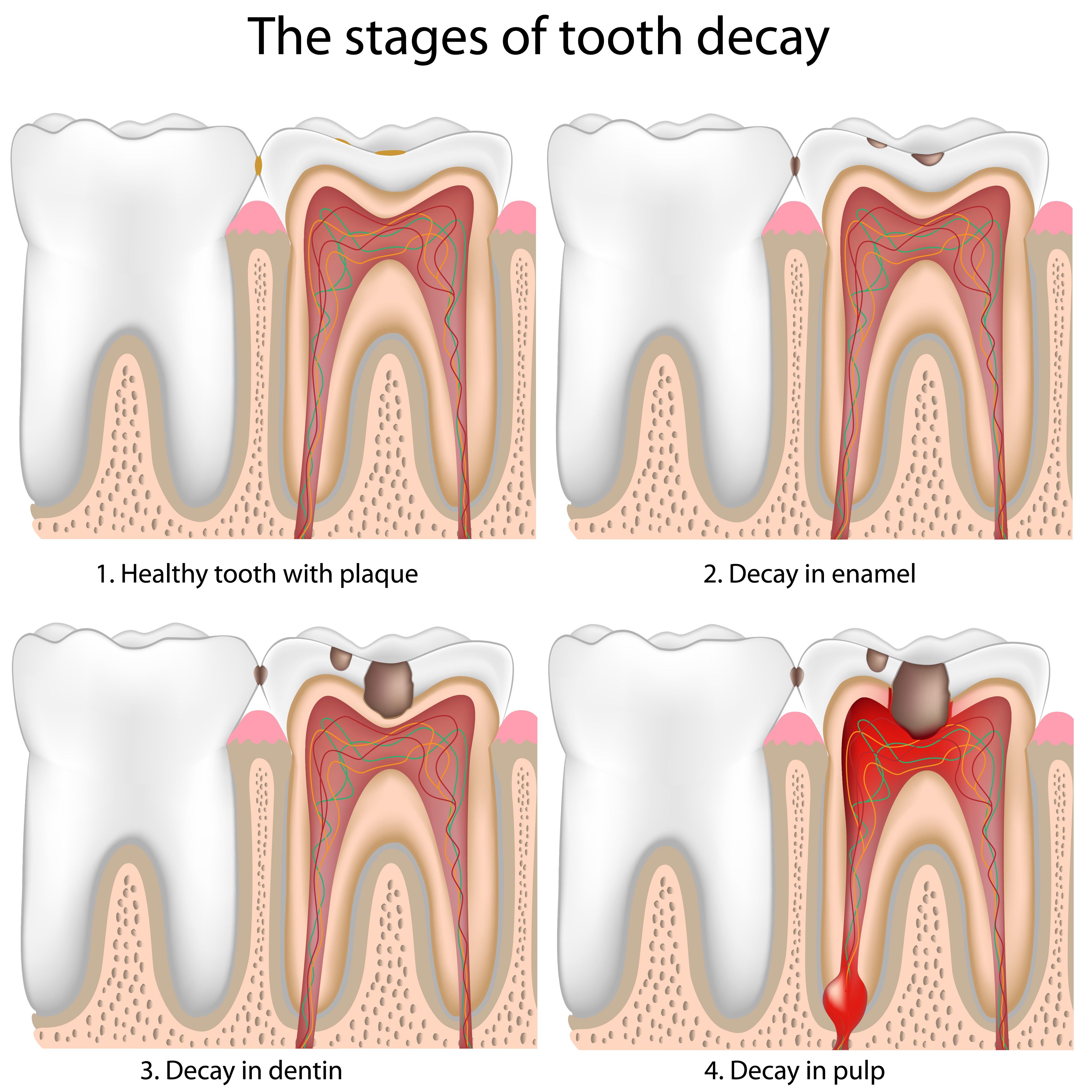The Stages of Tooth Decay
 Tooth decay doesn't happen after one sugary splurge, but it will develop over time with repeated exposure to sweet foods and regular neglect of your oral hygiene. Practicing good oral hygiene and seeing your dentist every six months for an exam and cleaning are the best ways to prevent tooth decay and protect the smile. When tooth decay develops, restorative dentistry treatments are available to repair damage and prevent the spread of decay.
Tooth decay doesn't happen after one sugary splurge, but it will develop over time with repeated exposure to sweet foods and regular neglect of your oral hygiene. Practicing good oral hygiene and seeing your dentist every six months for an exam and cleaning are the best ways to prevent tooth decay and protect the smile. When tooth decay develops, restorative dentistry treatments are available to repair damage and prevent the spread of decay.
If you suspect you're suffering from one of the stages of tooth decay, you're encouraged to contact Jackson, MS dentist Danny O'Keefe to learn more about your treatment options.
Stage 1: White or Brown Spots
One of the earliest signs of tooth decay is a white or brown spot, also called a lesion, within the enamel. These spots are a result of the demineralization of the enamel. Demineralization is caused by a buildup of plaque on the teeth. Plaque is made up of food remnants, saliva, and bacteria. The bacteria feed off of sugars and starches left on the teeth and excrete acid. It is this acid that weakens the enamel by degrading the minerals within this layer of the teeth. In many cases, it's possible to reverse the demineralization process and prevent lesions from advancing through fluoride treatment.
Stage 2: Enamel Decay
If lesions are left untreated, bacterial acids will continue to demineralize the outer layer of the tooth until the enamel is penetrated and the inner dentin layer of the tooth is exposed, resulting in a dental cavity. At this stage, the teeth are often sensitive to sweet and sour foods, and temperature fluctuations between hot and cold. In order to prevent decay from progressing, cavities must be treated by a dentist, most commonly with a dental filling.
Stage 3: Dentin Decay
When enamel decay is left untreated, it will progress into the dentin layer. The dentin is more porous than the enamel, which causes decay progression to move at a faster pace. This leads to larger dental cavities and more intense tooth sensitivity. Tooth decay that has reach the dentin may be too severe for a traditional dental filling and instead require alternative treatments, such as onlays or dental crowns.
Stage 4: Pulp Damage
Decay that progresses beyond the dentin will eventually reach the inner chamber of the tooth, where the pulp tissues, nerves, and blood vessels reside. Once these tissues are reached, they are vulnerable to bacterial infection, commonly called a root canal infection.
Root canal infections are extremely painful because they directly impact the nerves responsible for tooth sensitivity. Root canal infections also cause the pulp tissues, nerves, and blood vessels to break down and die, increasing the risk of tooth loss as well as the spread of infection. Once a root canal infection forms, it must be treated with root canal therapy followed by some form of dental restoration, such as a dental crown.
Stage 5: Abscess Formation
If a root canal infection is left untreated, the pulp tissues, including the nerves and blood vessels, will continue to decay and the infection will spread. The infection may spread to the jawbone and other structures that support the teeth, creating a pus-filled pocket called an abscess. Abscesses commonly form around the roots of the teeth but as they grow, can affect the gums and cheek, leading to inflammation and pain. Dental abscesses require immediate treatment from a dentist to prevent the further spread of infection. Depending on the severity of infection, abscesses may be treated with root canal therapy or tooth extraction.
Schedule a Consultation
To learn more about tooth decay, or to find out which treatments are right for you, please schedule a consultation with Dr. O'Keefe today.



